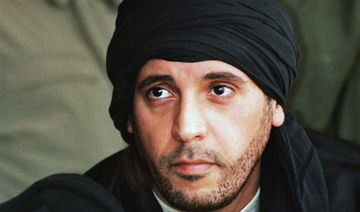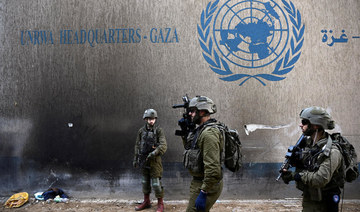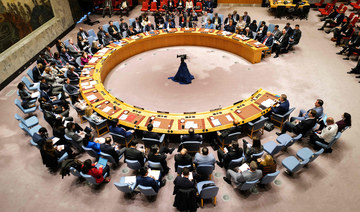BEIRUT: People across Lebanon have been left stranded and struggling to find fuel for heating as snowstorm Yasmine continues to wreak havoc.
President Michel Aoun’s media office said he had instructed the relevant authorities to provide assistance to people in affected areas and had been following the work of military, security and civil agencies as they sought to clear roads.
As the storm intensified on Wednesday night, entire cities and villages in the Bekaa and northern regions were cut off, while power cuts left residents without heating.
Snow fell at an altitude of 500 meters above sea level, leaving dozens of towns along the eastern and western mountain chains isolated. Most main and mountain roads at an altitude of 1,100 meters and above were completely cut off.
Snow also engulfed the runways at Beirut Airport, though did not prevent operations, and covered beaches in the northern cities of Byblos and Beirut and the southern city of Sidon.
Also in Sidon, firefighters rushed to tackle a blaze after a school bus was set on fire by lightning.
Along the banks of the Hasbani River in Shebaa and the neighboring villages of Arqoub the snowfall was recorded at up to a meter deep.
Footage shot in some of the worst affected areas went viral on social media.
In some regions the authorities issued warnings to motorists against driving as the freezing temperatures covered roads with ice.
The Ministry of Public Works warned people against trying to find alternative routes around snow-blocked roads until the authorities had clarified the situation and issued guidance.
The director-general of the Lebanese Civil Defense, Brig. Gen. Raymond Khattar, said the agency had responded to multiple calls from around the country, while the army said it was helping to get fuel to people in need and clear snow from roads.
Meanwhile, many people have complained about not being able to buy gas or diesel to heat their homes as they have become too expensive and too scarce.
Many gas stations ran out of diesel, which is mainly used for heating in mountain regions, as the price of a 20-liter canister reached $17.
Some people resorted to burning charcoal, while those less fortunate did their best to stay warm by wrapping themselves in blankets.
“The lack of heating is not limited to mountainous areas, but rather to cities and Beirut in particular,” a Civil Defense worker told Arab News.
“In poor homes we found children and the elderly curled up with only blankets,” the person said.
Speaking about the diesel shortage, Economy Minister Amin Salam said: “Those who try to monopolize diesel will be pursued, especially in mountainous areas.”
Meanwhile, Energy Minister Walid Fayyad spoke of “violations committed by diesel distributors who do not abide by the specified fees.”
“There is an active black market taking commissions of up to 10 or 15 percent,” he said. “This is a crime. The perpetrators must be prosecuted and measures must be taken against them.”
One of the groups to be worst hit by the bad weather were the Syrian refugees — especially those in barren areas of Bekaa — whose flimsy plastic tents were left covered in snow.
UNICEF said on Thursday that Japan had contributed $1.8 million for humanitarian aid through the Adolescent and Youth, and Water Sanitation and Hygiene programs in Lebanon.
The money would be used to help 35,000 vulnerable children and families, it said.
Over the next two months, when temperatures at high altitude can fall to minus 5 degrees Celsius (23 degrees Fahrenheit), UNICEF will distribute blankets and warm clothing to vulnerable people with limited or no access to heating, as well as continuing to provide water and sanitation services within Bekaa.
Okubo Takeshi, Japan’s ambassador to Lebanon, said: “We are fully aware of the gravity of the ongoing humanitarian crisis in Lebanon where true victims are always vulnerable children and families.
“As they face the harsh winter conditions, Japan has decided to strengthen its interventions through UNICEF to alleviate their sufferings. I hope they receive our message through the assistance that the international community will be there with you at all times.”
Takeshi then tweeted: “No winter lasts forever, nor will the Lebanese crisis. Relief must come. May God protect Lebanon.”
Meanwhile, Lebanon’s acting Information and Education Minister Abbas Al-Halabi said the Cabinet’s discussions of the government’s 2022 draft budget would be completed by Friday.
























